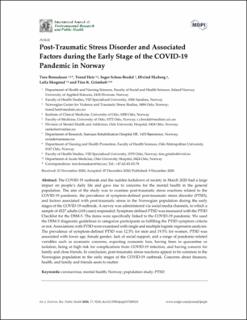Post-traumatic stress disorder and associated factors during the early stage of the COVID-19 pandemic in Norway
Bonsaksen, Tore; Heir, Trond; Bredal, Inger Schou; Ekeberg, Øivind; Skogstad, Laila; Grimholt, Tine Kristin
Peer reviewed, Journal article
Published version
Permanent lenke
https://hdl.handle.net/11250/2737947Utgivelsesdato
2020Metadata
Vis full innførselSamlinger
- Artikler / Articles [1185]
- Publikasjoner fra CRIStin [1132]
Originalversjon
International Journal of Environmental Research and Public Health. 2020, 17(24), 10.3390/ijerph17249210Sammendrag
The COVID-19 outbreak and the sudden lockdown of society in March 2020 had a large impact on people’s daily life and gave rise to concerns for the mental health in the general population. The aim of the study was to examine post-traumatic stress reactions related to the COVID-19 pandemic, the prevalence of symptom-defined post-traumatic stress disorder (PTSD), and factors associated with post-traumatic stress in the Norwegian population during the early stages of the COVID-19 outbreak. A survey was administered via social media channels, to which a sample of 4527 adults (≥18 years) responded. Symptom-defined PTSD was measured with the PTSD Checklist for the DSM-5. The items were specifically linked to the COVID-19 pandemic. We used the DSM-5 diagnostic guidelines to categorize participants as fulfilling the PTSD symptom criteria or not. Associations with PTSD were examined with single and multiple logistic regression analyses. The prevalence of symptom-defined PTSD was 12.5% for men and 19.5% for women. PTSD was associated with lower age, female gender, lack of social support, and a range of pandemic-related variables such as economic concerns, expecting economic loss, having been in quarantine or isolation, being at high risk for complications from COVID-19 infection, and having concern for family and close friends. In conclusion, post-traumatic stress reactions appear to be common in the Norwegian population in the early stages of the COVID-19 outbreak. Concerns about finances, health, and family and friends seem to matter.
Beskrivelse
This article is an open access article distributed under the terms and conditions of the Creative Commons Attribution (CC BY) license

